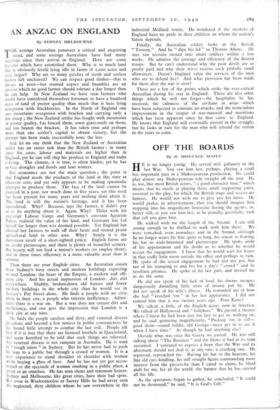AN ANZAC ON ENGLAND
By SYDNEY MELBOURNE
THE average Australian possesses a critical and enquiring mind, and some average Australians have had many surprises since their arrival in England. Here are some features which have astonished them. Why is so much land that is obviously fertile lying idle in farms of i,000 acres and even larger? Why are so many patches of scrub and useless bushes left uncleared? We can respect good timber—that is always an asset—but stunted copses and brambles are an eyesore which no good farmer should tolerate a day longer than he can help. In New Zealand we have seen farmers who would have considered themselves fortunate to have a hundred acres of land of poorer quality than much that is here lying overgrown with blackberries. In the North of England one sees mountains overgrown with bracken and carrying only a few sheep ; the New Zealand settler has fought with mountains of poorer quality, has fenced them, sown grass-seeds on them, and has beaten the bracken. It has taken time and perhaps more than one settler's capital to obtain victory, but the attempt has been made successfully none the less.
And let no one think that the New Zealand or Australian settler has an easier task than the British farmer ; in many cases his costs, labour and materials are higher than in England, yet he can still ship his produce to England and make a living. The climate, it is true, is often kinder, yet he has to face droughts and floods and lean winters.
But economics are not the main question ; the point is that England needs the products of the land at this time at whatever cost, and yet only appears to be making spasmodic attempts to produce them. The face of the land cannot be changed in a year, nor much done in five years, yet this need has been present for many years and nothing done about it. The land is still the nation's heritage, and it has been squandered. Why? Because, says the farmer, it didn't pay us to do anything about it. Again, Why? Hitler with his conscript Labour Corps and Germany's constant Agrarian Policy, realised the value of his land, and Germany has fed herself far longer than was deemed possible. Yet England has allowed her farmers to walk off their farms and turned prime agricultural land to other uses. Why? Surely it is the dancerous result of a short-sighted policy. English farms are no doubt picturesque, and there is plenty of beautiful scenery. But beauty will not feed a nation's workers (or employ them), and in these times efficiency is a more valuable asset than is scenery.
Then there are your English cities. An Australian comes from Sydney's busy streets and modern buildings expecting to find London, the heart of the Empire, a modern and effi- cient city. And his actual impression of London: dirt, dirt everywhere. Shabby, broken-down old houses and fewer modern buildings in the whole city than he would see in Sydney's Pitt Street alone. He finds a people with no civic pride in their city, a people who tolerate inefficiency. Admit- tedly there is a war on. But a war does not excuse dirt and inefficiency, and one gets the impression that London is a dirty city at any time.
He finds the people careless and dirty, and venereal disease prevalent, and beyond a few notices in public conveniences he has found little attempt to combat the last evil. People ask him if it is true that there are licensed brothels in Queensland, and seem horrified to be told that such things are tolerated. Yet venereal disease is not rampant in Australia. He is used to " rough joints " in Sydney. But he has never had to push his way to a public bar through a crowd of women. It is a new experience to stand shoulder to shoulder with women while buying a glass of beer. And he has not yet got accus- tomed to the spectacle of women smoking in a public place, a street or an omnibus. He has seen slums and tenement houses. Sydney and Melbourne, like great cities, have their bad spots. But even in Wooloomooloo or Surrey Hills he had never seen the neglected, dirty children whom he saw everywhere in the industrial Midland towns. He wondered if the mothers of England have no pride in their children on whom the nation's future depends.
Finally, the Australian soldier looks at the British " Tommy." And he " dips his lid " to Thomas Atkins. He sees raw recruits turned into smart soldiers within a few weeks. He admires the courage and efficiency of the British troops. But he can't understand why the poor devils are so poorly paid and why their wives receive such pitifully small allowances. Doesn't England value the services of the men who are to defend her? And what provision has been made for them after the war is over?
These are a few of the points whiCh strike the ever-critical Australian during his stay in England. There are also other things which he will not forget—the hospitality he has received, the calmness of the civilians in areas which have been subjected to constant air-attacks, and the tremendous improvement in the output of war-material and munitions which has been apparent since he first came to England. He knows that England will eventually prevail in the struggle, but he looks in vain for the man who will rebuild the nation in the years to come.


























 Previous page
Previous page